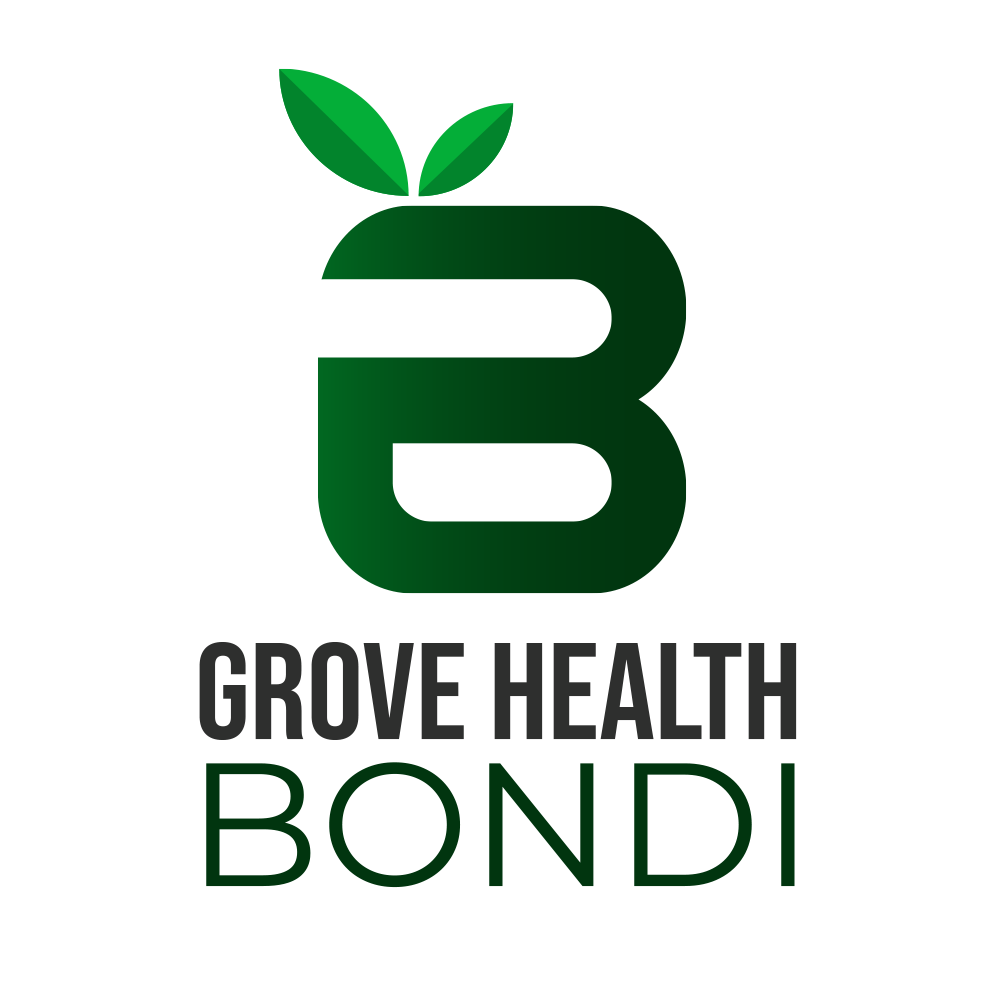“Keto diet foods” and “Keto diet” are popular keywords for a trending diet method among young people today. If you’re following the Keto diet but unsure what to eat, avoid, or limit, join Grove Health Bondi in exploring this guide!
Keto diet foods are low in carbohydrates and high in fat, used in the Keto diet (or Ketogenic diet), which is a high-fat, adequate-protein, low-carbohydrate diet known for weight loss and health benefits.
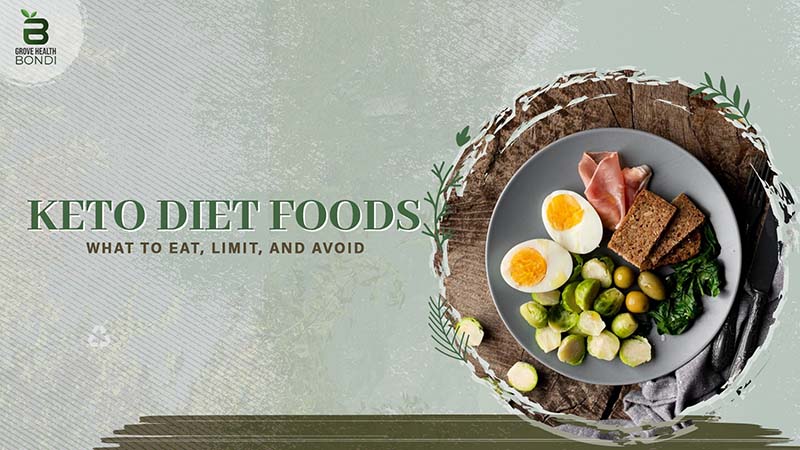
1. What Can You Eat on a Keto Diet?
The Keto diet focuses on reducing carbohydrate intake and increasing fats in daily meals. Here are some foods you can eat while following the Keto diet:
1.1 Keto Food Pyramid
On the Keto diet, you gradually reduce the amount of carbohydrates in your daily meals and replace them with healthy fats. The total carb intake should not exceed 20g per day.
Unlike traditional diets that emphasize low-carb grains for weight loss, the Keto food pyramid focuses on high-fat foods with very little or no carbs. The goal is to create a carb deficit and push the body into a state of ketosis. In ketosis, fats are used as the primary energy source for the body.
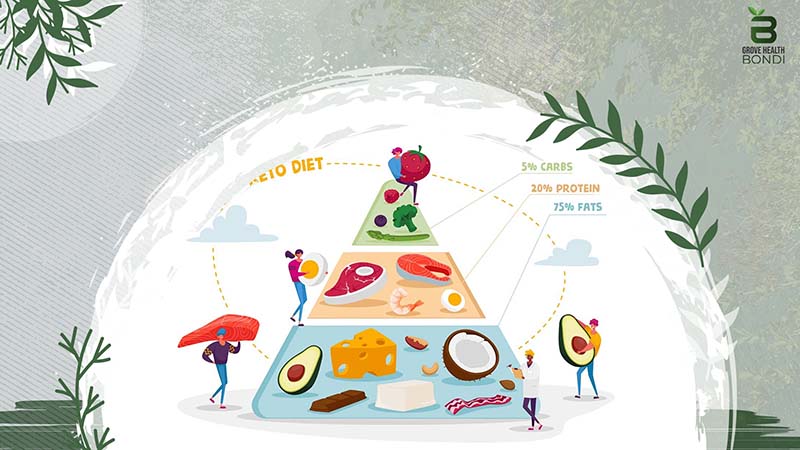
1.2 Distribution of Foods in the Keto Diet
The Keto diet categorizes food distribution as follows:
- Carbohydrates: 5-10% of total daily energy intake
- Protein: 25-30% of total daily energy intake
- Fats: 70-80% of total daily energy intake
Understanding the precise amount of protein, carbs, and fats needed in the Keto diet is the first step to creating a perfect diet plan. This helps achieve ketosis and supports effective weight loss.
To quickly estimate your nutritional needs, use the Keto Macro Calculator. This tool provides the exact grams of carbs, fats, and protein you need daily to achieve your desired weight loss results.
2. 16 Best Keto Diet Foods
The Keto diet includes foods that are low in carbohydrates and high in fats. So, what are “keto diet foods” and which are the best? Here’s a list of the best Keto-friendly foods:
2.1. Seafood
Seafood like crab, shrimp, and fish have very low carb content, averaging 0-1g of carbs per 100g of meat. Therefore, seafood is perfect for the Ketogenic diet. Additionally, fish like salmon, mackerel, and sardines provide omega-3, vitamins, and minerals.
Eating fish regularly helps with weight loss, improves brain health, and reduces the risk of heart disease and obesity.
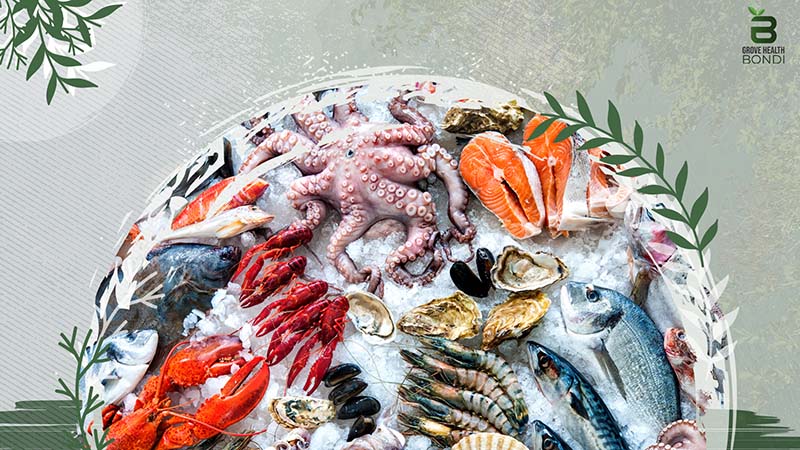
2.2. Low-Carb, High-Fiber Vegetables
Green vegetables are rich in fiber and low in carbs. On average, every 100g of green vegetables contains about 3-5g of carbs. Dark green vegetables like spinach, kale, and mustard greens also have plenty of vitamins, minerals, and antioxidants.
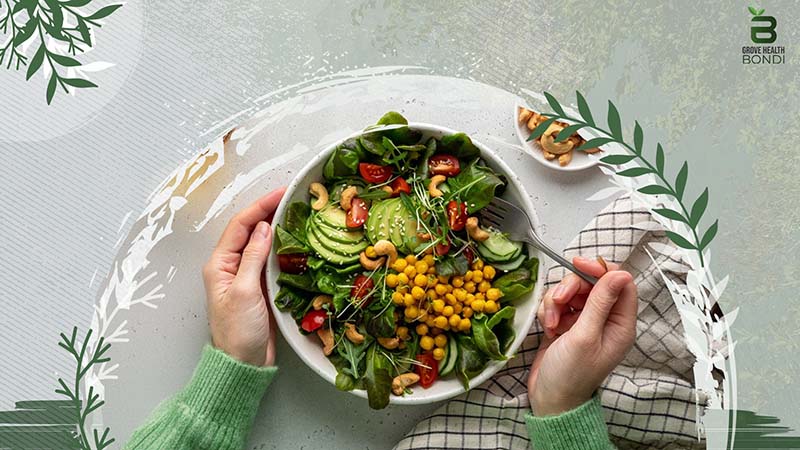
2.3. Cheese
Most cheeses are low in carbs and high in fats. For example, 28g of cheddar cheese has only 1g of carbs, 6g of protein, and is rich in calcium. Cheese also contains CLA (Conjugated Linoleic Acid), which helps reduce fat and prevent muscle loss due to aging.
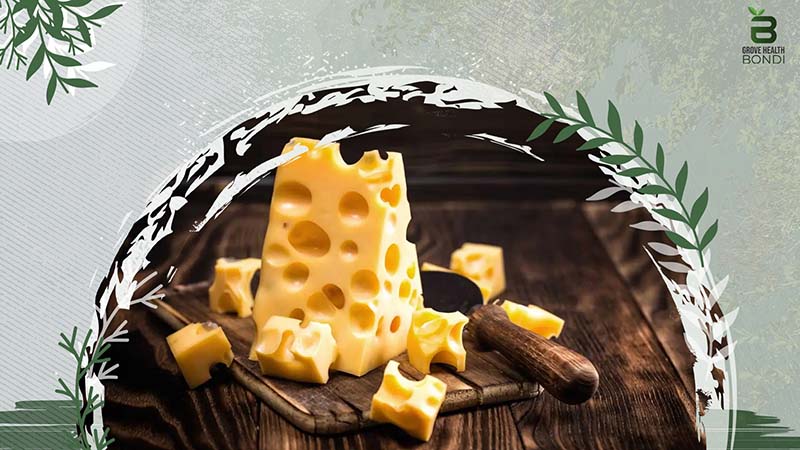
2.4. Avocado
Avocado is a staple in keto diet foods because it contains healthy fats and low carbs. Half an avocado provides 3.7g of carbs and a wealth of vitamin A and beta carotene antioxidants, boosting immunity and improving vision.
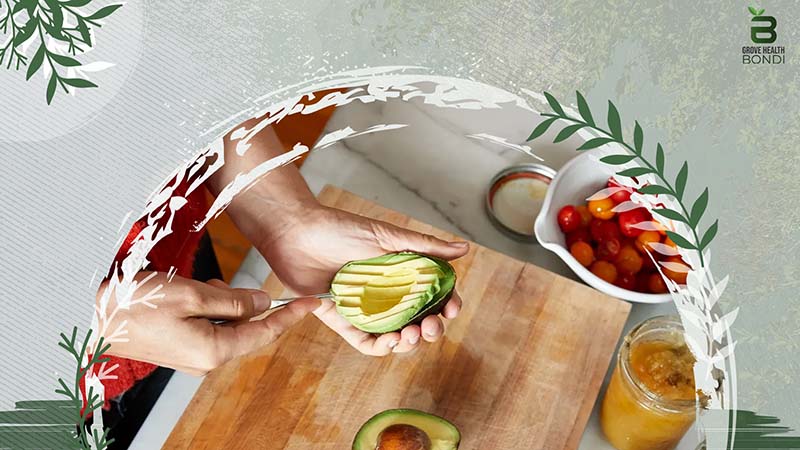
2.5. Meat
Meat is an essential keto diet food because it provides necessary energy. Most meats like beef, chicken, and pork are carb-free and rich in vitamin B and protein, aiding in fat burning and muscle building.
2.6. Eggs
Eggs are a good protein source, with 1g of carbs and 6g of protein per egg. Eating eggs regularly helps suppress hunger and increases satiety, making it easier to control calorie intake.
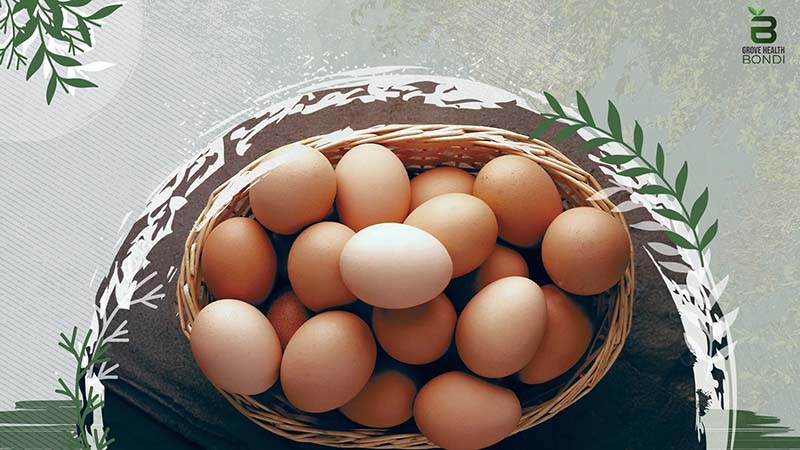
2.7. Coconut Oil
Coconut oil is high in lauric acid, a natural saturated fat beneficial for health, providing antibacterial properties and heart health benefits. Each small spoon of coconut oil has only 0.1g of carbs, making it an essential keto diet food.
2.8. Greek Yogurt
Each 100ml of Greek yogurt contains just 5-7g of carbs but is rich in protein. Greek yogurt helps curb hunger and reduces appetite, making it a great addition to the keto diet foods.
2.9. Olive Oil
Olive oil is carb-free but rich in oleic acid and polyphenols, reducing heart disease risk, inflammation, and improving artery function. Avoid cooking at high temperatures to maintain health benefits.
2.10. Nuts and Seeds
Nuts and seeds like macadamia, pecans, walnuts, almonds, chia seeds, and sunflower seeds are high in fiber and healthy fats. Each 100g contains about 15-20g of carbs. Consuming nuts daily helps prevent depression and cancer.
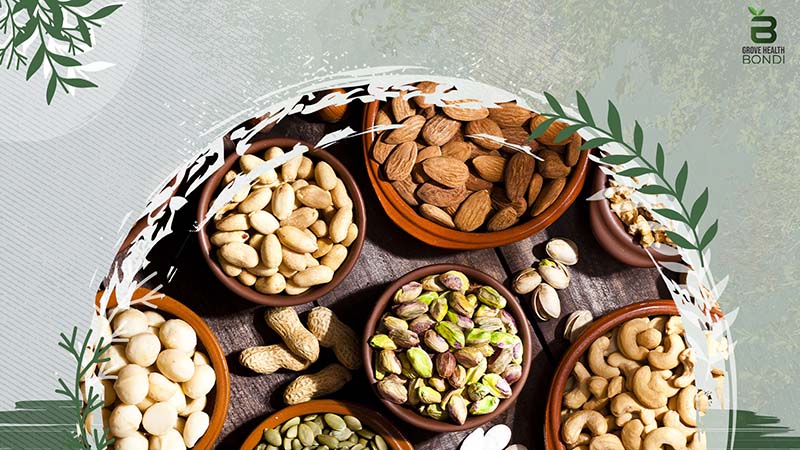
2.11. Berries
Most fruits are high in carbs, but berries like raspberries and strawberries are low-carb, about 15-20g per 100g. Adding berries to your diet helps prevent aging and promotes faster fat loss.
2.12. Butter and Margarine
Butter and margarine are high in fats and low in carbs. 100g of butter has 0.1g of carbs and 81g of fats, while 100g of margarine contains 0.78g of carbs and 75.8g of fats.
2.13. Shirataki Noodles
Shirataki noodles are a great Keto food with 1g of carbs and 15 calories per serving. Made from glucomannan, a fiber that slows food movement through the digestive tract, they help reduce hunger and support weight loss.
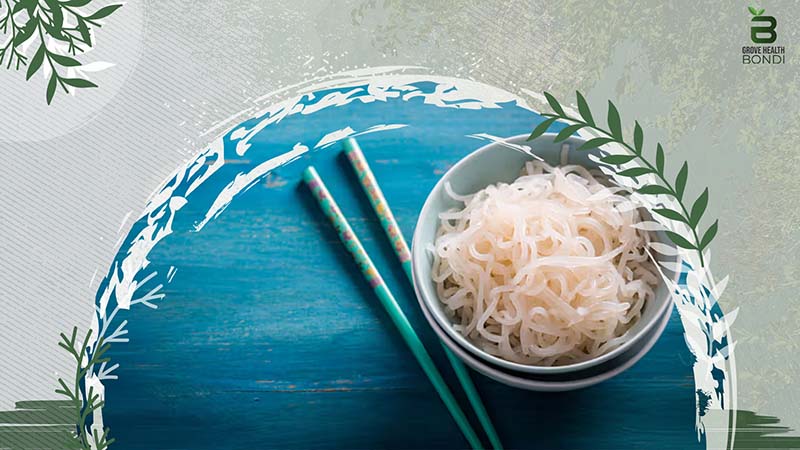
2.14. Olives
Each 100g of olives provides 6g of carbs. Olives are a good keto diet food, rich in vitamin E and minerals, promoting skin health and boosting immunity.
2.15. Unsweetened Coffee and Tea
Unsweetened coffee and tea are healthy, carb-free beverages. They contain caffeine, which boosts metabolism and alertness, and significantly reduce the risk of diabetes.
2.16. Dark Chocolate and Cocoa Powder
Dark chocolate and cocoa powder are almost carb-free but high in flavonoids, antioxidants that prevent obesity and lower blood sugar and cholesterol.
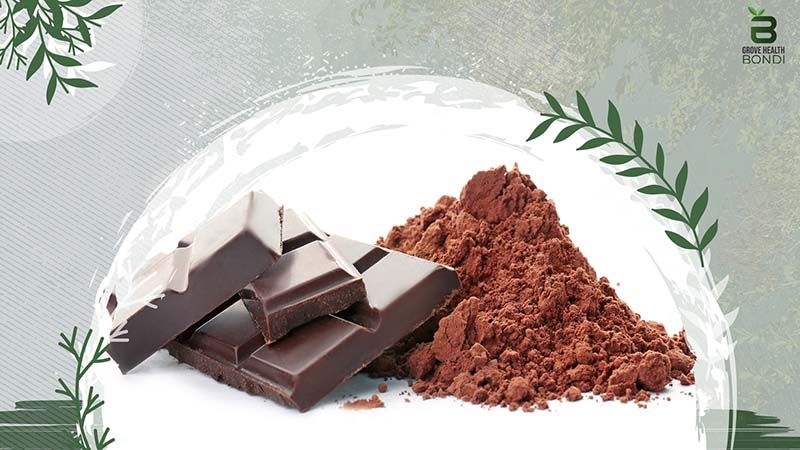
3. Foods to Limit on the Keto Diet
The Keto diet focuses on reducing carbs and increasing fats and proteins to burn body fat. To maintain ketosis, limit the following foods:
3.1. Full-Fat Milk
While full-fat milk products like cow’s milk, goat’s milk, cheese, and Greek yogurt are low in carbs, they contain natural sugars (lactose) that can hinder ketosis.
3.2. Medium-Carb Vegetables
Vegetables like sweet peas, artichokes, okra, carrots, beets, yams, and potatoes have moderate starch and carb levels and should be limited.
3.3. Legumes
Legumes like green beans, kidney beans, black beans, lentils, and soybeans are high in carbs and should be limited in daily meals.
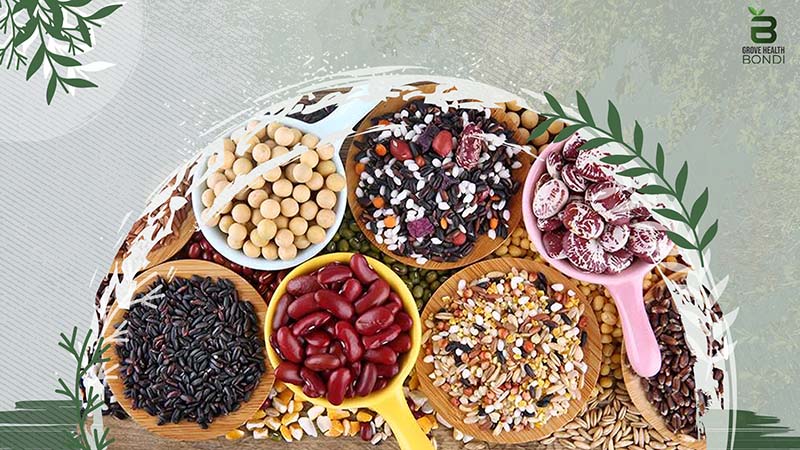
3.4. Most Fruits
While fruits are rich in vitamins, fiber, and minerals, most are not Keto-friendly due to high sugar (carb) content. Consume berries in moderation and limit other fruits.
3.5 Processed Foods
Processed foods often contain high carbs and are unsuitable for the Keto diet. Avoid processed foods like:
- Sandwiches, cookies, bread, muffins, and pancakes
- Canned soups and foods, and any fast food
- Foods with artificial ingredients like sweeteners, dyes, and flavors
3.6 Sugary, High-Calorie Beverages
Sugary and high-calorie drinks like sodas, fruit juices, and alcohol can increase belly fat. Reduce or avoid these drinks for better health and weight loss.
4. Is It Okay to Eat High-Carb or Non-Keto Foods?
To lose weight effectively with keto diet foods, control your daily calorie intake. Eating non-Keto foods can slow your fat loss progress. Carbs play a crucial role in ketosis; low carb intake forces the body to use fats for energy.
Eating too many carbs can shift the body from using fats to carbs for energy, stalling fat burning. While sticking to keto diet foods can help achieve ketosis, it’s not necessary for weight loss or health.
Use the keto diet foods list as a guide to create a suitable diet plan that aligns with your weight loss goals and overall health.
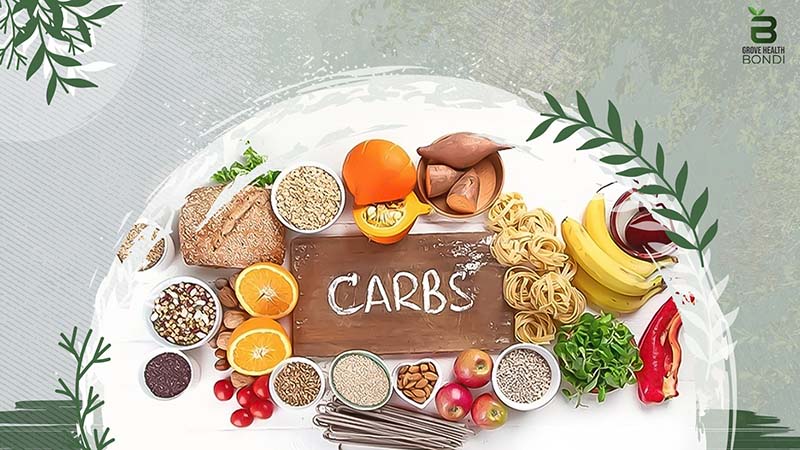
5. Tips for a Healthy Keto Weight Loss Diet
A major challenge of the keto diet foods is managing daily carb intake while increasing healthy fats. This diet can make it hard to absorb essential nutrients like calcium from milk and vitamin B from grains.
A proper and safe Keto diet requires balanced nutrients. Consult a doctor or nutritionist before starting Keto. Here are tips for a healthy Keto diet:
- Choose Nutrient-Dense Keto Foods: Build a balanced diet with fats and fiber from non-starchy vegetables. This ensures more nutrients and reduces hunger.
- Plan Weekly Meals: Preparing meals in advance saves time and helps control your diet.
- Monitor Daily Calorie Intake: This helps manage your nutrition and calorie intake to achieve health and weight goals.
The above is a comprehensive list of keto diet foods from Grove Health Bondi. We hope the information helps you achieve a healthy body and quick weight loss goals.
